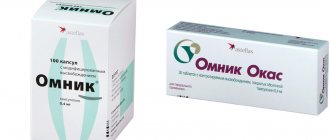Feature of the drug
According to reviews, Fluomizin helps eliminate sexually transmitted infections during pregnancy, which pose a great danger to the fetus. The active substance of this drug is dequalinium chloride, and also contains other auxiliary components.
The microbes on which they act are sensitive to the components of the drug and completely suppress their activity. Literally after a few days of using the drug, the result will be noticeable. This antiseptic acts very quickly, and a change in the nature of the discharge can be noticed almost immediately.
After the tablet is inserted into the vagina, it immediately begins to dissolve, resulting in a significant concentration of the active substance. This leads to the destruction of pathogenic organisms.
FLUOMISIN
Shelf life and storage conditions:
The drug should be stored out of the reach of children at a temperature not exceeding 25°C. Shelf life: 3 years. Do not use after the expiration date stated on the packaging.
Conditions for dispensing from pharmacies:
- — sanitization of the vagina before gynecological operations and childbirth.
- Pharmacokinetics
- When administered intravaginally, a very small amount of dequalinium chloride is absorbed through the vaginal mucosa into the systemic circulation, metabolized to a 2,2-dicarboxylic acid derivative and excreted in unconjugated form through the intestine.
- Contraindications
- - ulcerative lesions of the epithelium of the vagina and cervix;
- hypersensitivity to the components of the drug.
The use of dequalinium chloride before sexual activity is not recommended.
- Side effects
- very rarely - irritation (erosion), itching, burning or redness of the vaginal mucosa. However, these adverse reactions may also be due to symptoms of a vaginal infection.
very rarely - fever, allergic reactions.
- Instructions
- Release form, composition and packaging
white, oval, biconvex.
lactose monohydrate, microcrystalline cellulose, magnesium stearate.
6 pcs. — cellular contour packages (1) — cardboard packs.
Clinical and pharmacological group:
Antiseptic for local use in gynecology
- vaginal tablets 10 mg: 6 pcs. — LSR-008618/09, 10.28.09
- Dosage
- The recommended dosage regimen is 1 vaginal tablet/day.
The vaginal tablet is inserted deep into the vagina in the evening before bed, lying on your back with your legs slightly bent.
During menstruation, treatment should be stopped and the previous course continued after it ends.
It is necessary to carry out a full course of treatment (6 days) to avoid relapse.
- Overdose
- There are no data on overdose. With intravaginal use, an overdose is unlikely.
- special instructions
- Fluomizin contains excipients that sometimes do not completely dissolve in the vagina. Therefore, remnants of the vaginal tablet can be found on underwear. This does not affect the effectiveness of Fluomizin.
In rare cases, if the vagina is extremely dry, there is a chance that the tablet will remain undissolved. Therefore, before inserting the vaginal tablet, it must be moistened with water (for 1 second under running water).
During the treatment period, it is recommended to change pads and underwear more often.
If clinical signs of infection persist after completion of treatment, repeat microbiological testing should be performed to identify the pathogen and confirm the diagnosis.
During treatment with the drug, it is recommended to abstain from sexual intercourse. To prevent urogenital reinfection, simultaneous treatment of sexual partners is necessary.
Impact on the ability to drive vehicles and operate machinery
The drug does not affect the performance of potentially hazardous activities that require special attention and speed of psychomotor reactions (driving a car).
- Use of the drug
- There are no data on use in the first and second trimesters of pregnancy and during breastfeeding. It is possible to use the drug during pregnancy to sanitize the birth canal before childbirth.
If it is necessary to use the drug during lactation, it is necessary to decide on stopping breastfeeding.
- Drug interactions
- Fluomizin is incompatible with soap and other anionic surfactants.
- Compare prices and buy FLUOMIZIN
- We have selected the largest online pharmacies and invite you to compare prices:
Instructions for use
The drug "Fluomizin" is used quite often during pregnancy. Instructions for use are quite simple, as you only need to use 1 tablet per day. To do this, the drug is injected deep into the vagina, preferably right before bed, lying on your back and bending your knees.
Just 6 tablets are enough for a course of therapy. During this time, you can completely eliminate all the problems of the body. It is worth noting that this medicine has various side effects that need to be studied before use.
Instructions for use and side effects
Before you start taking Fluomizin suppositories, it is important to carefully read the instructions for use.
The recommended dosage is to take one Fluomizin vaginal suppository shortly before going to bed. It is inserted with the legs slightly bent, deep inside. After this, it is better not to get up and wait for the drug to dissolve.
Do not use Fluomizin suppositories during menstruation. Interrupt treatment before completion, and then start the course over again.
Fluomizin should be used even if there is a noticeable absence of symptoms. A full course is required. If this rule is not followed, the effectiveness of treatment is significantly reduced, which means the symptoms may return.
The full course of treatment with Fluomizin is carried out within six days to avoid relapse. But the effect is noticeable after the second or third application: vaginal discharge decreases each time. If there is no improvement, you should consult a doctor to re-diagnose and prescribe new treatment.
While using the drug, you cannot be sexually active , because if you do not avoid sexual contact, you can not only become infected again, but also transmit the infection to your partner.
The medicine does not affect the ability to drive a vehicle. You can also perform other actions that require increased attention and speed of reaction.
There are no restrictions on alcohol consumption while using Fluomizin.
Flowmizin is incompatible with soap.
Side effects
Rarely, after taking Fluomizin, irritation, itching or burning, as well as redness of the mucous membrane are observed. These symptoms may occur not only due to taking the drug, but also indicate an infection.
Very rarely, fever or allergic reactions such as hives or various rashes may occur.
Side effects disappear almost immediately after stopping the drug. Sometimes they are even invisible if the same symptoms are expressed by the disease being cured.
Contraindications for use
The drug should not be used for ulcerative lesions of the epithelium of the cervix and vagina, or if you are hypersensitive to the components of the drug; you should not use the drug before the start of sexual activity.
The only contraindication for use during pregnancy is the presence of ulcerative lesions of the mucous membrane of the vagina and cervix and intolerance to some components of the drug.
Indications for use
Fluomizin suppositories during pregnancy are prescribed to women in the following cases:
- treatment of sexually transmitted infections;
- sanitation of the birth canal before childbirth;
- disinfection before surgery.
This medicine has a wide spectrum of action. However, it is often used to treat vaginitis, which worsens during pregnancy as a result of a weakened immune system. The drug "Fluomizin" during pregnancy in the 1st trimester is considered a fairly safe drug, since only a small part of it is absorbed into the woman's bloodstream, and the rest is quickly eliminated from the body.
Indications
For almost any vaginal discharge of bacterial or fungal etiology, the drug Fluomizin (tablets) can be prescribed. Reviews of its effectiveness are usually positive. The drug is prescribed for the following pathologies:
- bacterial vaginosis;
- candidal vaginitis;
- trichomonas vaginitis.
The drug is also prescribed for sanitizing the vagina before childbirth and gynecological operations. The medicine “Fluomizin” (suppositories) is available freely in pharmacies. Reviews, price (relatively affordable), effectiveness and wide spectrum of action make this medication very popular.
Use during pregnancy
Since this antiseptic has virtually no contraindications, it can be used throughout pregnancy. Basically, sexually transmitted infections can be detected during testing in the first trimester. The drug "Fluomizin" during pregnancy in the 1st trimester is used only as prescribed by a doctor, if the benefit is much greater than the possible harm to the fetus.
Infectious diseases of the female reproductive system mainly worsen in the second and third trimester of pregnancy, as well as right before childbirth. A woman’s immunity during this period is significantly reduced, and the infection easily penetrates the body. Vaginitis poses a threat to the health of the pregnant woman and the child, who may become infected during childbirth. In addition, vaginitis causes significant discomfort to women.
Fluomizin is often prescribed for prenatal sanitation to protect the child from sexually transmitted infections. Regardless of the stage of pregnancy, Fluomizin can be used to treat the following diseases:
- thrush;
- vaginitis;
- chlamydia.
The drug "Fluomizin" can be taken in the early stages of pregnancy only after consultation with a specialist, as it has certain contraindications. The drug begins to act immediately after insertion into the vagina, and absorption occurs in minimal quantities, which eliminates the possibility of its penetration into the bloodstream and then to the fetus.
Fluomizin vaginal tablets 10 mg No. 6 in Nur-Sultan (Astana)
Instructions for medical use of the drug FLUOMIZIN®
Trade name Fluomizin®
International nonproprietary name Dequalinium chloride
Dosage form Vaginal tablets, 10 mg
Composition One tablet contains the active substance - dequalinium chloride 10 mg, excipients: lactose monohydrate, microcrystalline cellulose, magnesium stearate.
Description White or almost white, oval, biconvex tablets.
Pharmacotherapeutic group Antiseptics and antimicrobials for the treatment of gynecological diseases. Antiseptics and antimicrobials for the treatment of gynecological diseases (excluding combinations with corticosteroids). Quinoline derivatives. Dequalinium chloride. ATX code G01AC05
Pharmacological properties Pharmacokinetics After dissolving Fluomizin vaginal tablet (10 mg dequalinium chloride) in approximately 2.5-5 ml of vaginal fluid, the concentration of dequalinium chloride in vaginal fluid is 4000 - 2000 mg/l, which is higher than the MIC90 of all pathogenic microorganisms studied. Based on the results of preclinical studies in rabbits, it can be concluded that only a small amount of dequalinium chloride is absorbed after vaginal administration. Thus, the systemic effect of Fluomizin is insignificant and additional pharmacokinetic data are not available. Pharmacodynamics Fluomizin contains dequalinium chloride, a quaternary ammonium compound with broad antimicrobial activity against most gram-positive and gram-negative bacteria, fungi and protozoa, including Trichomonas vaginalis. Mechanism of action Dequalinium chloride is a surfactant. The main mechanism of action of dequalinium chloride is an increase in the permeability of the microbial cell and the subsequent loss of its enzymatic activity, which causes the death of the microbial cell. Dequalinium chloride demonstrates high bactericidal and fungicidal activity. Dequalinium chloride in the form of a vaginal tablet acts topically in the vagina. Noticeable relief from discharge and inflammation usually occurs within 24 to 72 hours. Pharmacokinetics/pharmacodynamics relationship The bactericidal effect of dequalinium chloride occurs within 30 to 60 minutes; the maximum local concentration within the first hour after administration is considered critical for effectiveness. Mechanism of resistance The mechanisms that determine the intrinsic resistance of some pathogenic microorganisms are not known. There have been no cases of acquired resistance of pathogenic microorganisms to dequalinium chloride. Test Points The susceptibility information below is descriptive and is based on concentrations that can be achieved in the vagina and corresponding minimum inhibitory concentrations of pathogens. Antimicrobial spectrum Usually sensitive microorganisms Aerobic gram-positive bacteria: Enterococcus faecalis, Listeria spp., Staphylococcus aureus, Streptococcus agalactiae (group B streptococci), Streptococcus pyogenes (group A streptococci). Aerobic gram-negative bacteria: Enterobacter spp., Escherichia coli, Klebsiella spp., Pseudomonas spp., Serratia spp. Anaerobic bacteria: Atopobium vaginae, Bacteroides spp., Fusobacteria, Gardnerella vaginalis, Prevotella spp., Peptostreptococci, Poryphyromonas spp. Fungi: Candida albicans, Candida tropicalis, Candida glabrata, Candida krusei. Resistant microorganisms Gram-negative bacteria: Proteus sp., Chlamydia trachomatis.
Indications for use - vaginal infections of bacterial and fungal origin (for example, bacterial vaginosis, candidal vaginitis) - trichomoniasis - preoperative prevention of infections during gynecological interventions and childbirth.
Method of administration and dosage It is recommended to use one vaginal tablet daily for six days. The vaginal tablet is inserted deep into the vagina in the evening before going to bed. It is better to do this while lying on your back with your legs slightly bent. During menstruation, treatment should be stopped and continued after menstruation. Discharge and inflammation usually subside within 24 to 72 hours, but it is necessary to continue treatment even if there is no longer any discomfort (itching, discharge, odor). Treatment duration less than 6 days may lead to relapse.
Adverse Reactions The following adverse reactions associated with dequalinium chloride have been reported in clinical studies. Common - vaginal discharge, vulvovaginal itching, vulvovaginal burning - vaginal candidiasis Rare - headache - nausea - vaginal bleeding, vaginal pain - bacterial vaginitis, fungal skin infection, vulvitis, vulvovaginitis The following adverse reactions have been reported in post-marketing experience with use: - formation of ulcers and maceration of the vaginal epithelium, intrauterine bleeding, redness, vaginal dryness - cystitis - fever, allergic reactions.
Contraindications - hypersensitivity to the active substance or any component of the vaginal tablet - ulcerative changes in the vaginal epithelium and cervix - childhood (girls who have not reached puberty).
Drug Interactions Anions such as soaps, detergents and surfactants may reduce the antimicrobial activity of dequalinium chloride. Therefore, the simultaneous use of soap, spermicides, or vaginal douches (vaginal rinses) is not recommended. Fluomizin 10 mg, vaginal tablets, does not affect the strength of latex condoms. There are no data on interactions with non-latex condoms and other intravaginal devices such as diaphragms, so their simultaneous use with Fluomizin is not recommended.
Special instructions Fluomizin contains excipients that may not completely dissolve. Residues of the tablet can sometimes be found on underwear. This does not affect the effectiveness of Fluomizin. Sometimes, if the vagina is dry, there is a possibility that the vaginal tablet will not dissolve and will come out of the vagina intact. As a result, this treatment in this case is not optimal, although it does not harm the mucous membrane. In such cases, before inserting the tablet into the vagina, it is necessary to moisten it with a small amount of water. To prevent contamination of linen, patients are recommended to use sanitary pads, observe personal hygiene rules, change linen daily and wash it at a temperature of at least 80°C. Pregnancy and lactation period. Fluomizin can be used during pregnancy and lactation. Four clinical studies involving 181 pregnant women found no adverse effects of dequalinium chloride on pregnant women or fetal/newborn health. Moreover, significant post-marketing experience shows the absence of toxicity of Fluomizin in relation to the health of the fetus/newborn. Animal studies regarding reproductive toxicity have not been conducted due to the low expected systemic exposure of dequalinium chloride. The systemic effect of Fluomizin on women who are breastfeeding is negligible. Therefore, no negative effects are expected on a breastfed baby. Features of the effect of the drug on the ability to drive a vehicle or potentially dangerous mechanisms Fluomizin does not affect the ability to drive vehicles and mechanisms.
Overdose Overdose of the drug has not been described. However, using high daily doses may lead to the formation of ulcers in the vagina.
Release form and packaging 6 tablets in a blister pack made of PVC/PE/PVDC film and aluminum foil. 1 contour package along with instructions for medical use in the state and Russian languages in a cardboard box.
Storage conditions Store at a temperature not exceeding 30°C. Keep out of the reach of children!
Do not use after the expiration date.
Conditions for dispensing from pharmacies Without a prescription
Manufacturer Rottendorf Pharma GmbH, Ennigerlo, Germany
Registration certificate holder Medinova AG, Zurich, Switzerland
Discharge after using suppositories
There may be a small amount of discharge after Fluomizin during pregnancy, as this drug can leak. To eliminate the consequences, during therapy you need to:
- carefully monitor hygiene;
- follow the doctor's recommendations;
- discontinue use during menstruation.
It is worth noting that if immediately after the introduction of suppositories the discharge is too strong, then this may be a sign of a repeated inflammatory process, as well as a deterioration in well-being. The following signs may indicate disturbances in the body:
- temperature increase;
- intense itching;
- release of clots mixed with blood.
It is necessary to consult a doctor in a timely manner to prevent more serious consequences, and also to stop taking the drug. If you ignore these problems, an inflammatory process of the uterus and kidneys may occur with a rapid increase in symptoms.
Directions for use and dosage
The woman needs to take a horizontal position and bend her legs. The tablet can be moistened with water to facilitate insertion. It is recommended to do this once a day before bed. The treatment period with the drug is 6 days.
During treatment, it is advisable to avoid sexual intercourse. In addition, you should be more careful about the frequency of changing underwear, since the tablets tend not to completely dissolve, leaving marks on the underwear.
If the drug is ineffective, you should tell your doctor about it. Most likely, you will have to take tests again to clarify the diagnosis.
You cannot combine Fluomizin with soap, as well as anionic surfactants.
How can Fluomizin be dangerous?
The drug "Fluomizin" for thrush during pregnancy can be harmful, so it should be prescribed exclusively by the attending physician, taking into account all available indications and contraindications. However, for most women they do not cause any side effects at all.
If the vaginal mucosa is affected, this drug is strictly prohibited, as this can cause a deterioration in health. If side effects occur, you should definitely contact your doctor, who can stop the course of therapy or prescribe analogues.
When using the drug "Fluomizin" you cannot be sexually active. The course of therapy implies the exclusion of sexual intercourse, since otherwise the treatment will be meaningless. The partner must undergo exactly the same treatment to eliminate the risk of re-infection.
The drug "Fluomizin" (suppositories). Instructions
The instructions describe the drug "Fluomizin" (suppositories) as an antimicrobial agent with a wide spectrum of activity. The active ingredient, dequalinium chloride, affects most gram-positive and gram-negative bacteria. Part of the active component, after introduction into the vagina, is absorbed through the mucous membrane, subsequently enters the bloodstream, metabolized and excreted through the intestines.
Medicine "Fluomizin" (suppositories). Instructions. Indications. Contraindications
The drug is prescribed for vaginitis (trichomoniasis and candidiasis), bacterial vaginosis. For urogenital trichomoniasis, it is more advisable to use the drug “Flagyl” (suppositories). The instructions also recommend the medicine for sanitizing the vagina before various gynecological operations or before childbirth. Fluomizin (suppositories) is not recommended for use in case of hypersensitivity, ulceration of the epithelial layer in the vagina and cervix. You should not resort to the remedy before starting sexual activity.
Mode of application
One vaginal suppository is recommended per day. Inject the drug as deeply as possible. For convenience, you need to lie on your back, spreading your legs and bending them at the knees.
Fluomizin (suppositories). Instructions. Side effects
During use, local irritation reactions, redness, itching of the vaginal mucosa, erosion, and burning may occur. It should, however, be said that these symptoms may be signs of a vaginal infection itself, and therefore it is quite difficult to differentiate them. Adverse reactions include allergic manifestations or fever.
special instructions
If menstruation begins, the instructions recommend stopping the use of the drug “Fluomizin” (suppositories) until the bleeding stops. The medication includes auxiliary components. They may not completely dissolve in the vagina and leak out, leaving stains on your underwear. In some cases, due to increased dryness, the suppository may not dissolve. To avoid this, it is recommended to hold the candle under water before insertion. However, this should be done carefully, since a very wet suppository will not be able to be used for its intended purpose. If the infection persists after therapy, it is necessary to undergo a microbiological examination again. Throughout therapy, sexual intercourse is not recommended. To prevent the spread of infection, both partners should be treated. Men are prescribed therapy with other drugs. Fluomizin does not affect the ability to concentrate, drive or operate machinery. There have been no cases of drug overdose recorded. The medicine is available in special packages of six suppositories, which corresponds to the course of treatment. Shelf life - no more than three years. Use after the specified period is not allowed. The drug is available by prescription.
Contraindications for use
According to reviews, Fluomizin during pregnancy cannot be combined with products containing anionic surfactants. However, it is worth noting that such drugs themselves are dangerous and are strictly prohibited from being used during pregnancy. When introducing the first tablets, you need to very carefully monitor your body’s reaction, as side effects may occur.
“Fluomizin” during pregnancy has mostly positive reviews, since the tablets act quite quickly and effectively. However, since side effects are still observed when using this remedy, special caution must be exercised.
In addition, it is worth considering that the use of absolutely any medications, including vaginal tablets, in the first trimester of pregnancy is strictly contraindicated. Therefore, before carrying out treatment, you need to think carefully about everything and use them only if absolutely necessary. If possible, sanitation of the birth canal should be carried out almost before the birth itself.
Vaginal tablets "Fluomizin" can be used completely calmly, since in most women they do not provoke absolutely any side effects. However, in some cases there may be itching, burning and a slight increase in temperature. In this case, you should definitely consult a doctor.
Fluomizin suppositories and instructions for their use: reviews and analogues
Finding a drug that can quickly help with thrush is not an easy task. Based on reviews, Fluomizin is a medicine that can help quickly cope with microbes and has a lasting antiseptic effect. Despite the tablet form of release, which causes some difficulties when taken, vaginal tablets in gynecology are considered a safe remedy indicated for the treatment of pregnant, lactating women and patients with both mild and advanced forms of candidiasis. The main advantages of the drug are the absence of harmful toxic effects, local absorption of the drug and immediate relief of the symptoms of candidiasis.
Composition, pharmacological action
Almost all women are familiar with vaginal candidiasis. Symptoms of the pathology cause physical and emotional discomfort, so you want to recover from the disease as soon as possible. Medicine offers a huge list of medications intended for therapy. The drugs are sold without a prescription, but prescribing them without consulting a specialist is prohibited. Some compounds can cause allergic reactions or aggravate the course of the disease, so first see a doctor, and then treatment.
One of the most effective remedies is Fluomizin. In a matter of hours, eliminating discharge, itching, burning, it completely eliminates all signs of the disease in a few days and is a good preventative against thrush.
Fluomizin is a medicine with local antiseptic and antibacterial effects. Available in the form of biconvex tablets, one package contains 6 tablets, sufficient for one course of therapy.
Recommended reading:
The active component included in the composition is dequalinium chloride. It is not exactly an antibiotic, but rather a broad-spectrum antimicrobial compound. The auxiliary components include lactose monohydrate, magnesium stearate, and microcrystalline cellulose. Dequalinium chloride has a detrimental effect on a wide range of gram-negative and gram-positive bacteria, protozoan single-celled organisms and fungal spores that cause vaginal candidiasis.
Contraindications, instructions for use
Fluomizin tablets are not indicated for the treatment of thrush in all patients. You should know for what diseases and for whom Fluomizin should not be used; the instructions for use strictly prohibit the use of tablets and suppositories in case of individual intolerance to the drug and erosive lesions of the epithelium of the cervix and vagina. In addition, Fluomizin suppositories are not used in pediatric practice; the prescription is carried out only upon reaching puberty.
As for whether Fluomizin suppositories can be taken during pregnancy, it all depends on the patient’s condition. The active substance included in the drug does not penetrate the placental barrier and does not harm the development of the fetus, so doctors allow the drug Fluomizin during pregnancy and lactation. All doctor's instructions should be strictly followed. Improper use of the medicine can lead to negative side reactions in pregnant women, especially in the 1st trimester. Often during pregnancy, the 1st trimester is prohibited from using any suppositories or vaginal tablets; the doctor selects other treatment regimens. You should also be treated with caution during lactation; the safety of the drug for the health of newborns has not been definitively established, which requires caution when using the drug.
Recommended reading:
There are several more immutable rules for Fluomizin to prove its effectiveness for thrush:
- During the period of the cycle, the drug should not be used, like any other broad-spectrum antibiotic. If therapy is interrupted by a cycle, upon completion of the cycle, therapy begins from the beginning.
- It is acceptable to soak the tablet in cool water so that it dissolves faster, but patients often say that it is extremely difficult to then insert the medicine into the vagina. It is better to take the tablet immediately after a shower, as it should be, at night.
- To prevent re-infection, you should abstain from sexual activity for the entire period of treatment.
- Suppositories should not be used for more than 6 days. Longer treatment can cause negative effects on the body of women.
Important! There are no side effects when taking medications correctly. Manifestations in the form of itching, burning, and increased body temperature dictate immediate cessation of therapy and a mandatory visit to the doctor. The composition of the drug is such that it can be combined with any other medications, but you should avoid washing intimate areas with soap - an alkaline environment can reduce the entire therapeutic effect. It is better to replace soap with intimate hygiene gel.
Analogues of the drug, reviews
Analogues of Fluomizin are not so easy to find; complete analogues do not exist. There are products a little similar to Fluomizin, analogues in composition and mode of action are as follows:
- Hexicon;
- Zalain;
- Livarol;
- Pimafucin;
- Terzhinan.
Note that many drugs are cheaper than Fluomizin, it is better to check how much the medicine costs at the pharmacy, the approximate price is $ 12-25. Despite the expensive cost, the product is popular because of its effectiveness, which is confirmed by reviews from patients.
Reviews
Larisa, 25 years old:
I took the pills and had no side effects. I treated vaginosis for exactly 6 days, as the doctor said. After the specified time, everything passed, there was no trace left. The main thing is not to start it, so that you don’t have to deal with complications.
Zhenya, 28 years old:
Until I encountered vaginosis for the first time during pregnancy, I had no idea how difficult it was. The doctor prescribed Fluomizin. I used it under supervision and reported on every symptom. Everything went well, the baby was born healthy. I was surprised that in just 6 days the entire pain went away. Good drug.
Ekaterina, 32 years old:
I want to say that the medicine is quite safe during pregnancy. The pills helped me, now they were prescribed to my sister, she is pregnant, first trimester, slight vaginosis - we decided to play it safe. The main thing is not to stop treatment after the symptoms disappear - they go away after the first pill, but you need to continue treatment.
Natalya, 23 years old:
In general, the drug is normal, but I noticed a large amount of discharge. It’s unpleasant to insert the tablets, but you can’t get them wet - I got them wet, the whole tablet crumbled in my hands, I couldn’t insert them at all. Suppositories are more convenient to insert, but tablets cure faster. All symptoms of thrush disappear almost immediately.
idermatolog.ru
The best analogues
If for some reason it is not possible to use Fluomizin, then it can be replaced with analogues. The drug "Terzhinan" is considered more affordable. In addition, among the popular analogues are the following:
- "Hexicon";
- "Vagisept";
- "Ginofor";
- "Pimafucin";
- "Ketoconazole";
- "Zalain."
The drug "Utrozhestan" is not an analogue. It is not recommended to use the medicine on your own; you should consult a doctor who will choose the best option.
Reviews about the drug
The drug "Fluomizin" during pregnancy has mostly positive reviews, as it helps to quickly cope with infectious diseases of the genital area and acts mainly locally. However, it is worth noting that this remedy is strictly prohibited from being used to treat thrush:
- children;
- women who are not sexually active;
- if you have allergies;
- in the presence of ulcers of the vaginal mucosa.
Many patients note that no side effects were observed when using this remedy, and in just a few days they were able to get rid of thrush and further sanitize the birth canal.
Some patients note that it is not entirely convenient to use vaginal tablets, and that after using this product some discomfort occurs. The tablets are not very convenient to administer; they break and crumble, and some of the product leaks out and stains the laundry.
Hexicon
This is an antiseptic substance, the active component of which is chlorhexidine bigluconate.
Like Fluomizin, this antiseptic suppresses gram-negative and gram-positive microorganisms.
It is effective against fungal and chlamydial infections.
The advantage of Hexicon is that it does not affect the vaginal microflora.
Minuses
The drug is that
during purulent infections it reduces its activity
, and acid-fast viruses and bacteria are resistant to it.
Apply
Gekiskon candles in such cases:
- before childbirth, operations and abortions;
- for the purpose of preventing infection with chlamydia and sexually transmitted diseases (gonorrhea, syphilis);
- in the treatment of vaginitis and exocervicitis in various forms of the disease.
Allergic reactions when using Hexicon are rare. But if there is itching in the vaginal area
, it is better
to discontinue the drug.
This drug is cheaper than Fluomizin. Price for 10 vaginal tablets – 250 rubles, 10 suppositories – 300 rubles.
Reviews from patients indicate the effectiveness of Gesikon.
Hexicon suppositories are slightly cheaper than Fluomizin, but no less effective. After developing an unpleasant odor and a burning sensation in the genitals, I decided, on the advice of a friend, to take Hexicon in a course according to the instructions for use.
The result simply amazed me. Within just a few days I got rid of the unpleasant symptoms. The suppositories worked as an antiseptic and helped cope with inflammation.
Galina, 37 years old
Treatment of sexually transmitted infections in pregnant women
Unfortunately, many things can ruin your mood during pregnancy. During pregnancy, both mother and unborn child are exposed to many dangers, especially at risk of sexually transmitted infections. Pathogenic bacteria pose a danger to the woman herself and her fetus; it can become infected as it passes through the birth canal. Any of these diseases must be treated before childbirth.
The drug Fluomizin is excellent in eliminating infections.
Is Fluomizin prescribed during pregnancy?
Yes, Fluomizin is an antiseptic that is used intravaginally, i.e. inserting into the vagina. The basis of Fluomizin is dequalinium chloride, a highly active component against most pathological bacteria: gram-positive and gram-negative, as well as protozoan microorganisms. The tablet dissolves in the vagina, resulting in a high concentration of dequalinium chloride, and as a result, the pathogenic flora is destroyed.
Fluomizin has a wide spectrum of action and can be prescribed to women during pregnancy in a large number of cases:
- treatment of sexually transmitted infections (bacterial vaginosis, trichomonas and candidal vaginitis);
- when sanitizing the birth canal on the eve of childbirth;
— in preparation for gynecological surgical interventions.
Vaginitis often worsens during pregnancy due to decreased immunity. In addition to discomfort, it also poses a real threat to the pregnant woman and her child. When treating vaginitis, gynecologists recommend Fluomizin to their patients. A small part of it is absorbed into the blood, but is immediately excreted through the intestines. Therefore, Fluomizin is considered a safe drug for pregnant women.
Instructions for use:
Treatment with Fluomizin lasts 6 days. The main advantage of the drug, both patients and doctors, call its immediate effect: all symptoms of infection disappear within a few days, and recovery occurs very quickly.
But the symptoms of vaginitis will return if the treatment was not carried out according to the regimen prescribed by the doctor. Even if you do not observe any negative manifestations of the disease, the prescribed course must be completed.
Fluomizin is inserted into the vagina before bed, after all hygiene procedures have been completed. The easiest way to do this is while lying on your back, with your legs spread and your knees slightly bent: it is advisable to insert the tablet deeply, but not very deeply.
In order for the tablet to dissolve better, it should be moistened with water before inserting into the vagina, otherwise the necessary therapeutic effect will be absent. If a small part of the vaginal contents leaks from the vagina, there is no need to worry about this - this will not affect the effectiveness of Fluomizin in any way. It is necessary to change pads and underwear more often.
Fluomizin during pregnancy: warnings.
The instructions for the drug warn that the administration of Fluomizin tablets is strictly forbidden to be combined with products containing anionic surfactants. Such drugs themselves are dangerous for anyone, and even more so for a pregnant woman, so you should completely avoid them in any case.
During Fluomizin therapy, vaginal sexual activity is completely excluded, especially since your partner must undergo a course of appropriate treatment to protect you from re-infection. Constantly monitor your body's reaction - at the initial stage, minor side effects are possible: burning, itching, erosion, swelling, fever.
Fluomizin is contraindicated during pregnancy. if there are ulcerative lesions of the mucous membranes of the vagina or cervix, as well as in case of individual intolerance to the components of the drug.
Fluomizin during pregnancy. Despite the positive aspects of treatment with this drug, adverse reactions still occur, so your caution with this drug will not be superfluous.
Please note that in the first 3 months, the use of any medications, including vaginal tablets, is highly undesirable! Therefore, before using Fluomizin in the first trimester of pregnancy, it is better to think twice. If possible, postpone debridement of the birth canal as close to the expected date of birth. Be more attentive to yourself: do not allow the development of infection in cases where it depends on you.
Author of the publication: Margarita Ignatova
Comments (2):
Should the treatment continue in the same way for erosion?
Lidiya Nikolaeva, -02-12 23:07:14:
As I understand it, infections can be found in pregnant women if they did not plan the pregnancy and took the appropriate tests in advance? Well, then of course you need to be treated with minimally harmful medications and, of course, as I understand it, no self-medication!
Add your comment:
instructions for use, analogues, composition, indications
Pharmacodynamics
Fluomizin contains dequalinium chloride, a quaternary ammonium compound that has anti-infective and antiseptic effects.
Mechanism of action Dequalinium chloride is a surfactant. The main mechanism of action is an increase in the permeability of bacterial cells and a subsequent loss of their enzymatic activity, which ultimately leads to the death of bacterial cells. Dequalinium chloride has high bactericidal activity. Dequalinium chloride in the form of a vaginal tablet acts locally inside the vagina. Pharmacokinetics/pharmacodynamics relationship For Fluomizin, no significant pharmacokinetics/pharmacodynamics determinant of effectiveness has been established. Since the bactericidal effect of dequalinium chloride is achieved within 30-60 minutes, the effective period of bactericidal action is the first hour after administration of the drug. Mechanism/mechanisms of resistance The mechanisms responsible for the intrinsic resistance of certain pathogens are not known. So far, no cases of acquired resistance have been observed. Breakpoints Research institutions do not require breakpoints for dequalinium chloride, so the relationship between minimum inhibitory concentrations and clinical efficacy has not been established. Therefore, the susceptibility information below is descriptive and is based on concentrations that can be achieved in the vagina (see Pharmacokinetics section) and corresponding minimum inhibitory concentrations of pathogens. The prevalence of acquired resistance in individual bacterial species may vary over time and geographical location. It is advisable to obtain local data on resistance, especially when treating severe infections. In some cases, an expert panel should be convened, especially when the local prevalence of resistance means that the benefit of the active substance is in question, at least in relation to some types of infections. Typically susceptible bacterial species • Aerobic gram-positive bacteria Enterococcus faecalis Lactobacillus spp. Staphylococcus aureus Streptococcus agalactiae
(group B streptococci)
Streptococcus pyogenes
(group A streptococci)
• Aerobic gram-negative bacteria Enterobacter spp. Escherichia coli Klebsiella spp. Pseudomonas spp. Serratia spp. • Anaerobic bacteria Atopobium vaginae Bacteroides spp. Fusobacteria Gardnerella vaginalis Prevotella spp. Peptostreptococci Poryphyromonas spp Species for which acquired resistance may be a problem
are not known.
Spontaneously resistant species • Gram-negative bacteria Proteus sp. Chlamydia trachomatis • Other microorganisms Trichomonas vaginalis Pharmacokinetics
After dissolving Fluomizin vaginal tablet (10 mg dequalinium chloride) in approximately 2.5-5 ml of vaginal fluid, the concentration of dequalinium chloride in it is 2000 - 4000 mg/l. Due to the fact that vaginal absorption is negligible, there are no data on the pharmacokinetics of dequalinium chloride in humans.
Fluomizin contains excipients that do not completely dissolve. Residues of the tablet can sometimes be found on underwear. This does not affect the effectiveness of Fluomizin. Sometimes, in cases where vaginal dryness is observed, there is a possibility that the vaginal tablet does not dissolve and is discharged entirely from the vagina. As a result, the treatment is not optimal, although it does not harm the mucous membrane. To prevent this, you can moisten the tablet with a small amount of water before inserting the tablet into the vagina. To prevent laundry contamination, patients are advised to use sanitary pads. To minimize the effects of dequalinium chloride on newborns, use of vaginal tablets should be discontinued 12 hours before delivery. There are no data on the effectiveness and safety of using the drug for re-treatment of patients who did not respond to primary therapy with Fluomizin or who relapsed immediately after primary therapy. If after treatment the symptoms of the disease persist or recur, you should consult your doctor. Increasing the daily dose or duration of therapy may increase the risk of vaginal erosions. There are no data on the use of the drug for the treatment of bacterial vaginosis in women under 18 years of age and over 55 years of age.
6 tablets in a blister made of PVC/PE/PVdC. 1 blister in a cardboard box with instructions for use.
Manufacturer
Rottendorf Pharma GmbH, Ostenfelder Strasse 51-61, 59320 Ennigerloh, Germany / Rottendorf Pharma GmbH, Ostenfelder Strasse 51-61, 59320 Ennigerloh, Germany.
Registration certificate holder
Medinova AG, Eggbuhlstrasse 28, 8050 Zurich, Switzerland / Medinova AG, Eggbuhlstrasse 28, 8050 Zurich, Switzerland
apteka.103.by
Fluomizin (dequalinium chloride)
Medinova Ltd, Switzerland
Active ingredient: Fluomizin
Release forms of Fluomizin
Vaginal tablets 10 mg No. 6
Who is Fluomizin indicated for?
- Vaginal discharge (fluor vaginalis) of bacterial and fungal origin (eg bacterial vaginosis and candidal vaginitis).
- Trichomonas vaginitis.
- Sanitation before gynecological operations and childbirth.
How to use Fluomizin
Method of administration and dose.
It is recommended to use 1 vaginal tablet daily for six days.
The vaginal tablet is inserted deep into the vagina in the evening before going to bed. It is better to do this lying on your back with your legs slightly bent.
During menstruation, treatment should be stopped and continued after it has stopped.
It is necessary to continue treatment, even if there is no longer a feeling of discomfort (itching, discharge, odor). The course of treatment is 6 days, treatment duration less than 6 days can lead to relapse.
Features of application.
Fluomizin contains excipients that do not completely dissolve. Remnants of the tablet can sometimes be found on underwear. This does not affect the effectiveness of Fluomizin.
Sometimes, in cases where vaginal dryness is observed, there is a possibility that the vaginal tablet does not dissolve and is discharged from the vagina entirely. As a result, the treatment is not effective, although it does not harm the vaginal mucosa. To prevent this, you can moisten the tablet with a small amount of water before inserting the tablet into a dry vagina.
To prevent soiling of patients' linen, it is recommended to use sanitary pads. Patients should be given recommendations regarding the rules of personal hygiene, daily change of linen and washing and ironing at a temperature not lower than 80°C.
Pregnancy and breastfeeding.
Fluomizin can be used during pregnancy and lactation. But, as with other medications, you need to be careful when prescribing Fluomizin to pregnant women in the first trimester of pregnancy.
Data from clinical studies have not revealed any adverse effects of dequalinium chloride on pregnant women and/or on the health of the fetus/newborn.
There is no data regarding the accumulation of dequalinium chloride in breast milk. Based on the absorption data and the fact that the treatment lasts only 6 days, adverse effects on the fetus or newborn child are unlikely.
Fluomizin does not affect the ability to drive vehicles and machines.
Side effects of Fluomizin
Sometimes there may be itching, burning or redness at the injection site. However, these adverse reactions may also be due to symptoms of a vaginal infection.
In isolated cases, local irritation reactions such as superficial vaginal bleeding (erosions) have been reported. In such cases, the surface of the vagina (vaginal epithelium) has previously been damaged, for example due to estrogen deficiency or inflammation.
Fever has been reported very rarely.
Who is Fluomizin contraindicated for?
Hypersensitivity to the active substance or to any component of the tablet.
Ulcerative changes in the vaginal epithelium and cervix.
Fluomizin is contraindicated in girls who have not reached puberty.
Fluomizin interaction
Interaction with other drugs is unknown.
Fluomizin is incompatible with soap and other anionic surfactants.
Fluomizin overdose
An overdose of the drug has not been described.
No comments yet!
Share your opinion
Dequalinium chloride suppositories - Symptoms and Treatment
The content of the article:
Fluomizin
Name:
Fluomizin
Pharmachologic effect:
Fluomizin contains the active substance dequalinium chloride, which is a quaternary ammonium compound with a wide range of antimicrobial activity. Dequalinium chloride acts on gram-positive microbes: streptococci of various types, including beta-hemolytic streptococci of groups A and B, as well as D, peptostreptococci, Staphylococcus aureus, listeria, gram-negative microbes: gardnerella, E. coli, fusobacteria, serracia of various types, Klebsiella, pseudomonads, Bacteroides, Proteus. It is active against yeast-like fungi of the genus Candida (C. tropicalis, C. albicans, C. krusei, C. glabrata), as well as against protozoa: Trichomonas vaginalis.
When administered intravaginally, the Fluomizin tablet dissolves in the vaginal fluid and creates a concentration of 4000-2000 mg/l in it, which is above the minimum threshold concentration of 90 for all microbes to which sensitivity has been determined.
Dequalinium chloride is a surfactant (surfactant), it increases the permeability of the cell membranes of microorganisms, leads to loss of activity of cellular enzymes and further destruction of cells, its action is limited to the vagina. A very small dose of dequalinium chloride passes through the integumentary epithelium of the vaginal mucosa into the general bloodstream, where it is metabolized to a sulfuric acid derivative and excreted in an unbound form through the intestinal tract. The effectiveness of the drug appears after 2-3 days and is accompanied by a decrease in swelling of the vaginal tissues, mucous membranes and a decrease in the amount of leucorrhoea.
Indications for use:
Backvaginosis with the possibility of using the drug before receiving test results, candidal colpitis, trichomonas colpitis, nonspecific vaginitis and vulvovaginitis, if necessary, sanitization of the vagina before childbirth, gynecological and surgical interventions.
Method of application:
The recommended dosage frequency is 1 vaginal tablet at night for 6 days. Fluomizin tablet is inserted deeper into the vagina while lying on your back, before going to bed. If menstruation occurs, treatment is stopped and procedures are resumed after its completion.
The duration of the course of therapy is at least 6 days; reducing the course of treatment contributes to the recurrence of infection and the possible emergence of resistant microorganisms.
Adverse events:
Very rarely, a local reaction from the mucous membranes may occur: itching, burning, redness of the mucous membrane. But it should be noted that these symptoms are also characteristic of a vaginal infection.
There have been isolated cases of local irritation reactions such as superficial bleeding from the inner lining of the vagina against the background of hypoestrogenism or an inflammatory process, and skin rashes.
Other: very rarely - increased body temperature, allergies in people sensitive to individual components of the drug.
Contraindications:
Individual intolerance to the active substance or other components of the drug, erosive damage to the stratified squamous epithelium lining the walls of the vagina and cervix. It is not recommended for use by girls before sexual activity begins.
During pregnancy:
During pregnancy, taking the drug is possible. These research results did not reveal any harmful effects of dequalinium chloride on the health of the fetus and newborn.
There is no information regarding the penetration of the active substance into breast milk; use only after consulting a doctor.
Interaction with other drugs:
Unknown. Not compatible with detergents and other anionic surfactants.
Overdose:
Data on cases of overdose are unknown. Due to the insignificant penetration of the drug into the general bloodstream, an overdose is unlikely.
Release form of the drug:
Tablets for vaginal use 10 mg. There are 6 pcs in a blister. Cardboard pack.
Storage conditions:
Store at a temperature not exceeding 25 °C. After the expiration date indicated on the blister and cardboard packaging, do not use. Keep away from children. Valid for 48 months.
Compound:
Dequalinium chloride in one vaginal tablet 10 mg.
Excipients: lactose monohydrate, microcrystalline cellulose, magnesium salt of stearic acid.
Additionally:
The auxiliary ingredients included in the composition of Fluomizin may not partially dissolve in the secretion of the vaginal glands, then it is possible to detect tablet residues on underwear. The presence of this fact does not affect the effectiveness of the drug.
In case of excessive dryness of the vaginal mucosa, it is necessary to moisten the tablet in water for several seconds before insertion to prevent it from dissolving.
During vaginal sanitization, it is recommended to change underwear and pads more often. When undergoing a course of treatment, it is necessary to abstain from sexual activity, and also treat your sexual partner.
If symptoms of infection remain after therapy, repeated bacterioscopic and bacteriological examination is necessary to detect the infectious agent and clarify the diagnosis.
Drugs with similar effects:
Hepilor (Happylor) Pantestin (Panthestin) Medasept (Medasept) AHD 2000 (AHD 2000) Etonium (Etonium)
Didn't find the information you need? Even more complete instructions for the drug “fluomizin” can be found here:
pro-tabletki.info /fluomizin
Dear doctors!
If you have experience in prescribing this drug to your patients, share the result (leave a comment)! Did this medicine help the patient, did any side effects occur during treatment? Your experience will be of interest to both your colleagues and patients.
Dear patients!
If you were prescribed this medicine and completed a course of therapy, tell us whether it was effective (helped), whether there were any side effects, what you liked/disliked. Thousands of people search the Internet for reviews of various medications. But only a few leave them. If you personally do not leave a review on this topic, others will have nothing to read.
Thank you very much! /sitemap-index.xml
Source: www.provizor-online.ru










